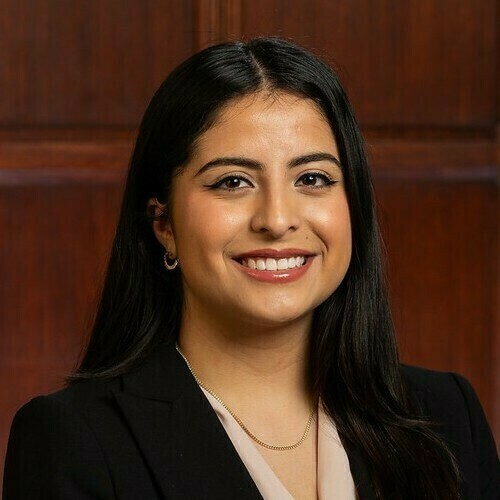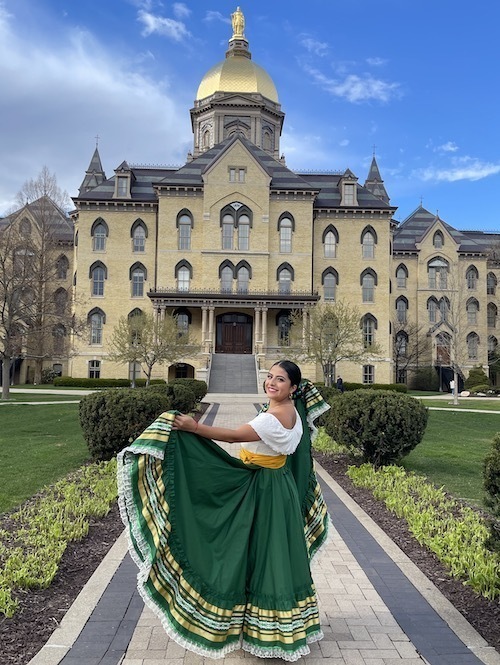Irasema Trujillo was 6 when she and her mother immigrated to the United States from Benito Juarez, Michoacán, Mexico in 2007.
Growing up in Indiana, Trujillo initially didn’t understand English and communicated with her American step-sister, Lilly, through play, body language, and facial expressions.

At school, Trujillo was sometimes embarrassed that her first language and culture were different from her classmates. As a way to fit in, she adopted the Americanized nickname Sammy.
But in 2020, when she enrolled at the University of Notre Dame and met faculty who looked like her and cherished their roots, she was inspired to embrace her heritage.
“If I wanted to be the person I want to be, then I needed to start being true to myself,” said Trujillo, now a senior majoring in political science, global affairs, and Latino studies.
That included introducing herself by her given name, Irasema [E-rah-seh-ma].
Throughout her four years at Notre Dame, Trujillo immersed herself in College of Arts & Letters courses to glean a variety of perspectives and pathways “to make the world a better place for all.” She engaged in research, leadership, and service projects around the state, country, and globe — including in South Bend, Florida, Texas, Washington, D.C., Brazil, Italy, and Morocco.
“I’m doing all these things that are wonderful, but it’s going to be for nothing if I'm not able to pave the way for other generations, to open opportunities and resources to others,” she said. “I think I was meant to be the difference for individuals like me and give back to people who are in the position that I used to be in.”
Contributing to a better society
When Trujillo and her mother arrived in the U.S., they didn’t have the required government documentation. But after filing paperwork for more than a decade, in 2018, they secured legal permanent residence.
The wait, though, was occasionally nerve-wracking.

When she was 8, a police officer pulled over the car that her mother was driving. The officer told her mom — who had a driver’s license in Mexico, but not in Indiana because she couldn’t demonstrate citizenship — that if she ever drove again she would be deported.
The experience fueled Trujillo to co-lead the Notre Dame Student Policy Network’s Indiana Driving Record Card Project, which conducted research and advocated for legislation that would allow migrants to drive legally without proof of citizenship.
Trujillo has also engaged in politics at the national level. While studying in the Washington Program in spring 2022, she took classes in the nation’s capital and attended Ketanji Brown Jackson’s U.S. Supreme Court nomination hearing and confirmation. She also interned for U.S. Rep. Alexandria Ocasio-Cortez, with responsibilities that included researching immigration and civil rights.
Throughout her time at Notre Dame, Trujillo has sought to empower immigrants “who want a better life and want to contribute to a better society.”
The Balfour-Hesburgh Scholar — a high-achieving student from an underrepresented population — has prepped Latino children for the naturalization test; translated and helped immigrants understand their legal rights; and mentored high-school age children of migrant farmworkers.
Embracing identity
Trujillo’s view of migration transformed in spring 2023 when she visited the Morocco-Spain border while researching anti-immigrant sentiment and its implications for human rights.

“That moment made me realize migration is a global phenomenon,” she said. “Leading up to this point, I thought the migration phenomenon was only U.S.-Mexico-based.”
She also gained international perspective in Brazil while examining heightened vulnerability of migrant women, and in Rome, studying the impact of anti-immigrant sentiment on Italian legislators.
“I love this nexus between research, policymaking, and transit nation migration patterns,” Trujillo said.
She’ll continue to explore that niche in the fall at the University of Oxford, where she’ll earn a master’s in migration studies. After that, she plans to pursue a degree in international law and launch an immigration law firm.
“You can help the most by being you,” said Trujillo, who is now fluent in Spanish, English and Arabic. “You are not defined by where you were born, you’re defined by what you do next. Reclaim your narrative, embrace your identity.”
Full circle
On campus, Trujillo has embraced her identity in myriad ways, including in the Institute for Latino Studies’ Regional Dances of Mexico, Ballet Folklorico course.

This spring, the class performed at a benefit quinceañera and the sold-out Latin Expressions creative showcase, both of which were sponsored by the Latinx Student Alliance [LSA].
“This was my first time performing in front of my mom since I was a little girl in Mexico,” said Trujillo, who is co-president of LSA. “Things came full circle.”
Trujillo’s sister, Lilly, was the first person to help her acclimate, and then flourish, in the U.S. When Lilly died in a car crash in high school, Trujillo was emotionally shattered.
“Lilly was the person I most looked up to,” she said. “Lilly was my guide.”
While Trujillo considered attending college, she didn’t have the money to do so. A high school teacher, though, told her about the Lilly Endowment Community Scholarship Program, which provides academically talented students with tuition for four years at any Indiana college or university.
Thinking that the name of the scholarship was a good sign, she applied. She was right — winning a Lilly scholarship made her Notre Dame education possible.
This summer, she’ll visit family and work at Notre Dame Mexico, which isn’t too far from her hometown, where approximately 130 million monarch butterflies spend the winter each year before flying to the U.S. and Canada.
“It’s very symbolic,” she said. “The butterflies, although they travel everywhere in the world, they always have a home and they always come back to that, and that's what I want to do.”
Originally published by at al.nd.edu on May 17, 2024.